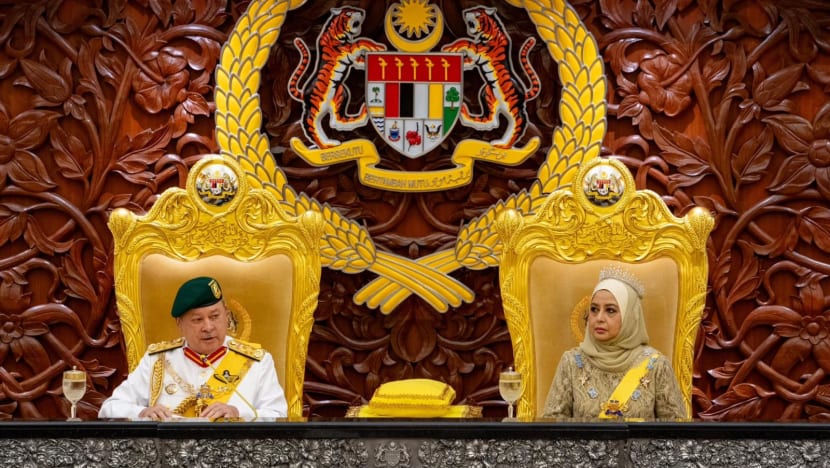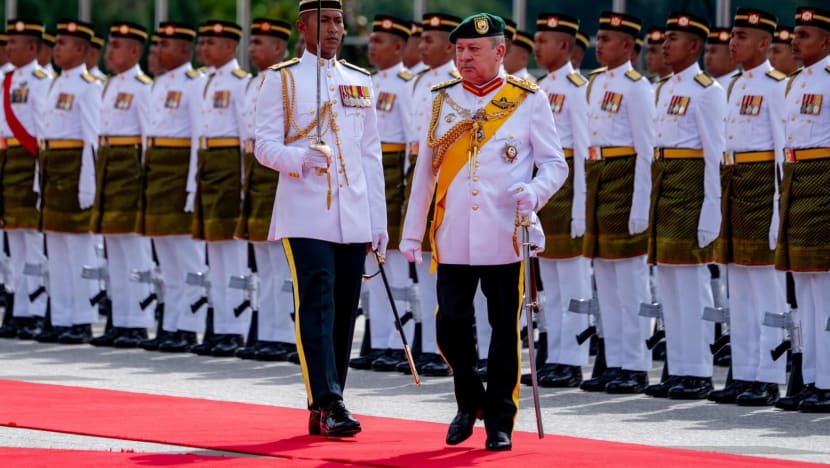‘Relief’ for Malaysia PM Anwar as king emphasises political stability, gets on board economic agenda
New king Sultan Ibrahim also kept his maiden parliamentary speech to around 30 minutes so members would not fall asleep.

Malaysia king Sultan Ibrahim Sultan Iskandar (left) at the opening of the third session of the 15th parliament on Feb 26, 2024. (Photo: Facebook/Anwar Ibrahim)

This audio is generated by an AI tool.
SINGAPORE: Newly installed Malaysian king Sultan Ibrahim Sultan Iskandar warned opposition lawmakers against disrupting political stability on Monday (Feb 26), in a maiden parliamentary speech that will likely bolster the position of Prime Minister Anwar Ibrahim and his unity government.
At the opening of the third session of the 15th parliament, Sultan Ibrahim also expressed support for Mr Anwar’s economic reforms and raised concerns about the country’s debt, urging the government to improve its fiscal position.
Both points attracted thumps of support from the House, packed with Members of Parliament (MPs) dressed in white ceremonial garb.
The loudest cheers came when the king declared he would not entertain any moves to derail political stability, a veiled reference to earlier speculation that the opposition Perikatan Nasional (PN) was trying to overthrow the unity government using backdoor manoeuvres.
“I wish to stress here that I will not entertain any requests from anyone who tries to disrupt political stability,” said Sultan Ibrahim, who took over as king on Jan 31 from Sultan Abdullah Ri'ayatuddin.
“Everyone must respect the unity government. For those who want to play politics, wait for the next election.”
In early January, talk of a “Dubai Move” surfaced when it was alleged that powerful political figures met in Dubai to identify government MPs who could be persuaded into defecting, with an eventual aim to topple Mr Anwar’s parliamentary majority.
The speculation has since lost steam as more members of PN’s own leading component party, Parti Pribumi Bersatu Malaysia (Bersatu), have pledged allegiance to Mr Anwar in return for constituency allocations.
While Sultan Ibrahim has the power to decide on a new prime minister based on whether the premier commands majority support from MPs, he said his priority is the standard of living of Malaysia’s roughly 33 million population.
“So, I hope all MPs will care for (people’s) wellbeing, not for their own party politics or self-interest,” he added.
BERSATU THE "BIGGEST LOSER" AFTER KING’S SPEECH
Nusantara Academy for Strategic Research senior fellow Azmi Hassan told CNA the royal backing will be a “relief” for Mr Anwar.
Dr Azmi pointed out that Sultan Ibrahim, when he was still ruler of Johor, mentioned that he would not entertain opposition lawmakers who try to form a new government through statutory declarations of support from government MPs.
“So when the Yang di-Pertuan Agong said that officially in parliament, it is cast in stone that he will not entertain any procedure or any move to change the government (that’s) not via the general election,” he said, using the king’s official title.
“I guess it is a kind of relief for Dato’ Seri Anwar, who has for the past year faced an onslaught from the opposition, especially after the six state elections when Perikatan Nasional had a good outing and pursued these statutory declarations.”
The state elections last August saw PN make further inroads in traditional government strongholds, while increasing their stranglehold in their home bases of Kedah, Kelantan and Terengganu.
Independent political analyst Asrul Hadi Sani said PN must focus on becoming an effective opposition in parliament.
“It should work on energising its grassroots support and work towards maximising Malay voters in semi-urban and urban seats,” he said.
“Malay votes remain its only trump card, and they should not take it for granted.”
Bersatu has emerged as the “biggest loser” after the king’s speech, said Dr Ong Kian Ming, director of the philosophy, politics and economics programme at Taylor's University in Malaysia.
“More of its MPs will shift their support to Anwar because they do not see any prospects of becoming government and hence, want to gain access to constituency allocations,” he said.
“PAS (Parti Islam Se-Malaysia, another PN component party) is always more used to playing the long game and will consolidate its base to make more gains in the next GE including at Bersatu's expense.”
Still, Dr Ong said the opposition has “ample issues” it can use to attack the government without plotting to topple it.
“These include the weakening ringgit to historic lows, the weaknesses of the PADU system, and rising taxes and prices, just to name a few,” he said, referring to how the PADU central database to refine targeted subsidy handouts has raised cybersecurity concerns.
On Feb 20, Malaysia's ringgit hit its lowest level since the Asian financial crisis in 1998 to almost 4.8 against the US dollar, in what analysts said could spell political trouble for Mr Anwar.
"I’LL SCRUTINISE GOVERNMENT’S SPENDING"
The king’s address lasted roughly 30 minutes and was shortened, he said, so MPs do not fall asleep. “Wow, this speech is so long,” he remarked several times. “If it's too long people will sleep, so I shortened it.”
Defying expectations, he did not touch on recent topics that have made headlines, including plans to revive the High Speed Rail project connecting Kuala Lumpur and Singapore, as well as his consent to set up a royal commission of inquiry to review the handling of the cases involving the sovereignty of Pedra Branca, Middle Rocks and South Ledge.
Instead, Sultan Ibrahim spoke about Malaysia’s RM1.5 trillion (US$314 billion) national debt, which makes up 82 per cent of its gross domestic product (GDP).
“I feel regret when I hear that today's government is shouldering a huge debt,” he said, expressing concern about the government’s decades-long fiscal deficit.
“Will we leave this burden to our children and grandchildren? The answer lies with everyone in this House.”
Sultan Ibrahim said this consistently weak fiscal position will make it tough for the government to introduce new development projects or inject funds to grow the economy.
“So, I support the government's measures to be more cost-efficient, and to implement targeted subsidies,” he said, calling for broader measures like the fiscal responsibility law approved last year to better manage public funds, reduce debt and boost accountability.
“I will also continue to scrutinise the government's spending and ensure that every suggestion is for something that's really needed.”

While delivering this year’s budget last October, Mr Anwar said the government will trim spending on subsidies and social assistance in 2024 by around RM11.5 billion (US$2.41 billion) to a total of RM52.8 billion, as it moves towards targeted assistance instead of blanket subsidies.
One example of this rationalisation is by continuing electricity rebates for the poor, while phasing out diesel subsidies.
Mr Anwar’s government eventually aims to reduce the fiscal deficit to 3.5 per cent of GDP in the medium term, which will pave the way for the government to lower the debt-to-GDP ratio to 0.6.
To this end, Sultan Ibrahim on Monday pointed to the prime minister’s plans to grow and restructure economic and investment activity, including the National Energy Transition Roadmap, the Malaysia Madani framework and the mid-term review of the 12th Malaysia Plan.
“I also hope the government is proactive in implementing renewal plans to strengthen the country's international competitiveness with a strong economy that keeps up with the times,” he said.
“The government also needs to prepare attractive incentives and make processes more efficient, with federal policies that are suitable for every state, because every state has different circumstances, especially for real estate development projects.”
Sultan Ibrahim said he does not like “red tape” in government processes, and called for procedures to be reviewed and improved.
“I hope that during my reign, the government can obtain a more positive fiscal position each year,” he added, drawing thumps of support.
Mr Lee Heng Guie, an economist and executive director of the Socio-Economic Research Centre, said the king’s remarks on political stability will give Mr Anwar’s administration the “continuity” to implement its economic reforms.
But the king’s wish to see a positive fiscal position during his reign, which he said translates to a fiscal surplus as opposed to just a smaller deficit, means the government must “work harder” to achieve this aim, Mr Lee suggested.
“This requires (work on) two fronts: Expenditure restraint and revenue expansion,” he said.
“This is something that the fiscal strategic framework has to look into, in terms of how to enhance revenue, how to broaden the tax base, and how to conduct expenditure review to restrain unnecessary spending.”
Mr Lee said the Public Finance and Fiscal Responsibility Act passed last year, as well as subsidy rationalisation, are good platforms to constrain and monitor spending, while the economic plans proposed by Mr Anwar, and the king’s desire to reduce red tape, will make it easier to attract investment.
“If we have good investments and people making money, they can be taxed,” he said.
Mr Lee said the king’s statement on monitoring government expenditure also shows that the government has to spend transparently and within its means.
“He is telling the government that he knows it has fiscal constraints, so whatever it spends on must be done wisely and (without) hanky-panky,” he added.
Dr Ong said the king is rightly concerned about economic management because of his background as a businessman.
Sultan Ibrahim is a billionaire and maintains a high corporate profile, including a stake in the multibillion-dollar Forest City development project in Johor with China’s beleaguered developer Country Garden.
He has previously called for the Kuala Lumpur-Singapore high-speed rail (HSR) project to be revived, and told the Straits Times in December that the railway should be aligned such that the border crossing is via Forest City.
The king wants Mr Anwar to succeed in managing the economy for the good of the business community, of which the king is also an active participant, noted Dr Ong, a former deputy minister of international trade and industry.
“He knows that if the fiscal space for the government is constrained, it will have a negative effect on economic performance because of lower government spending, not enough catalytic infrastructure projects (including the High Speed Rail, for example), and a depreciating ringgit,” he added.


















